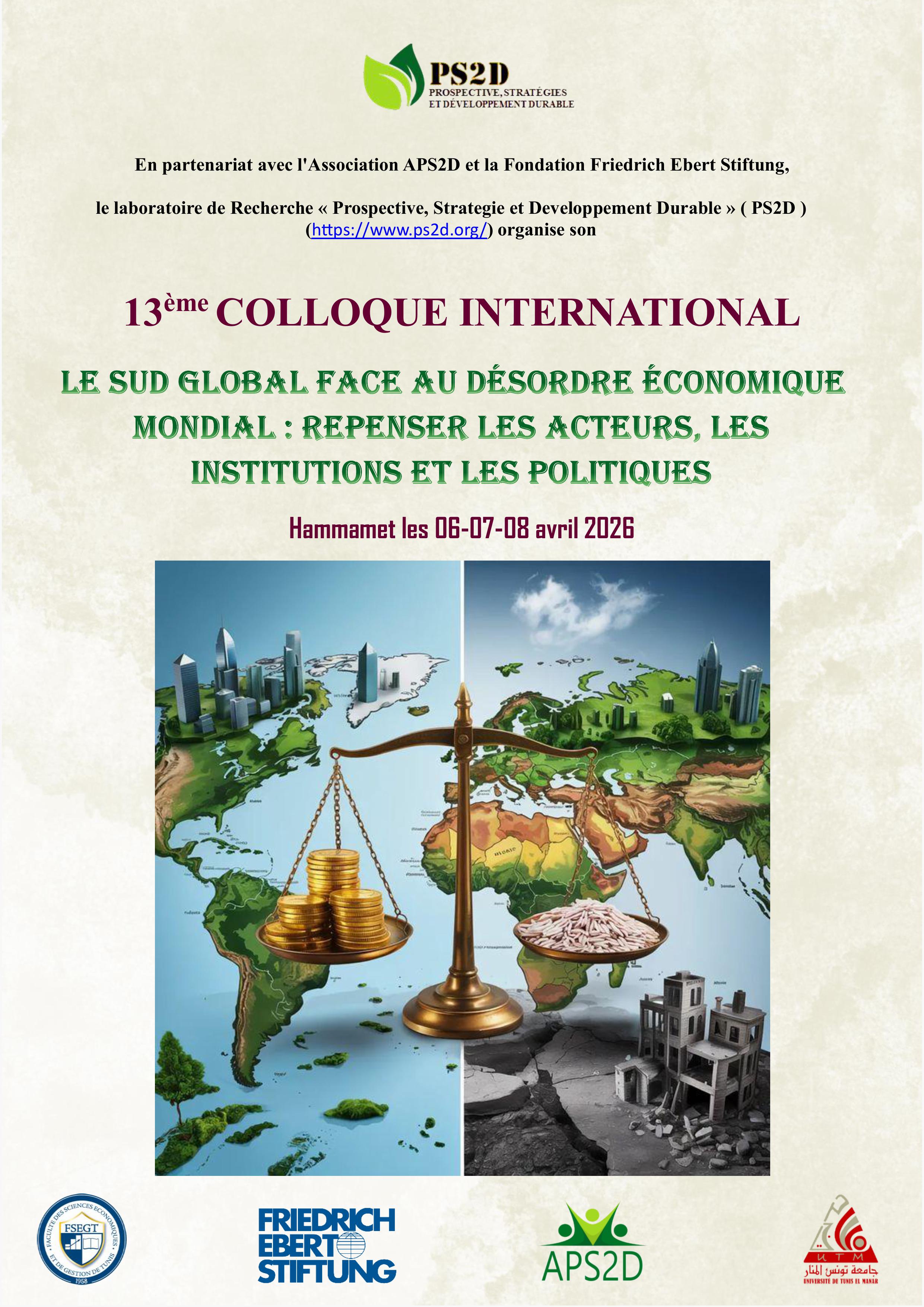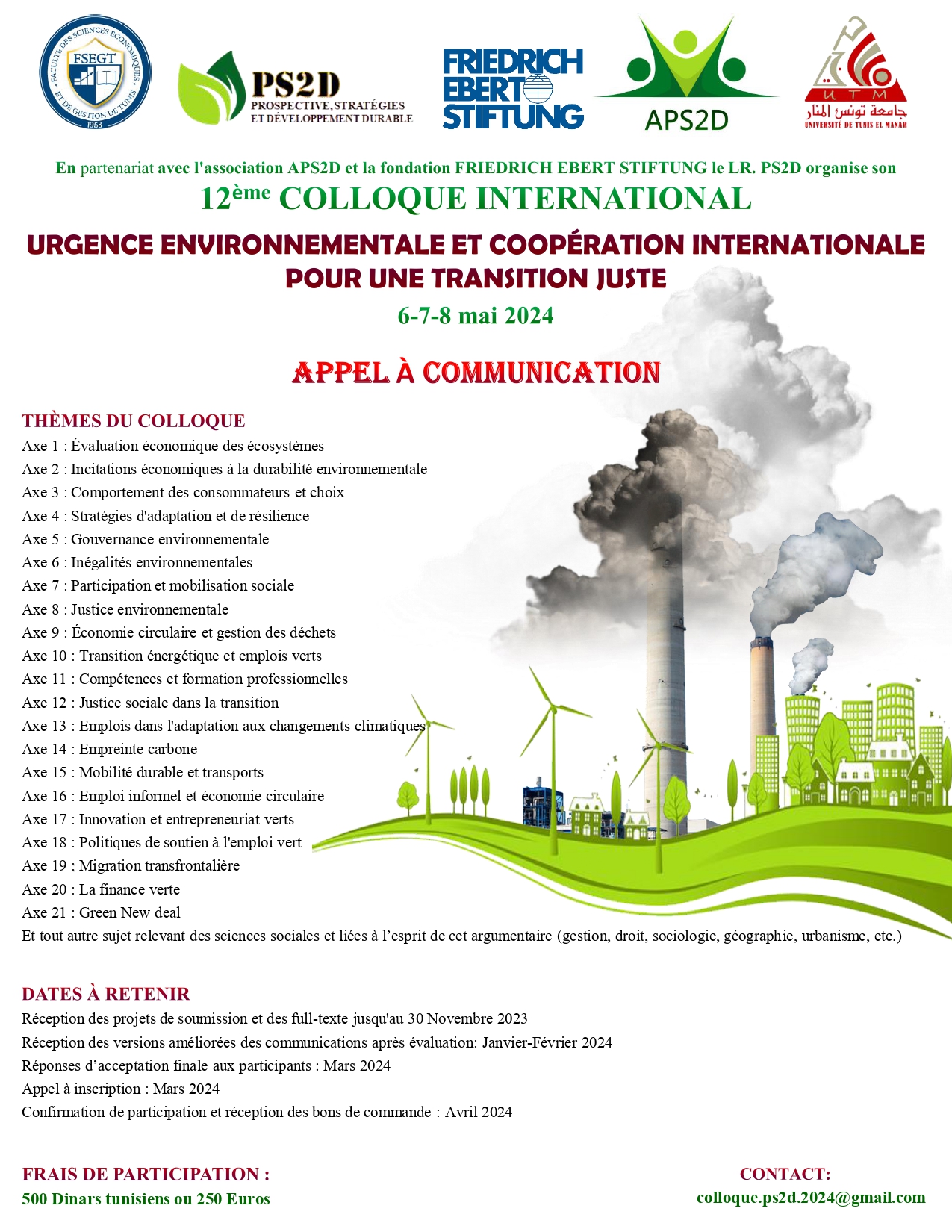Climate change : Economic, Social and Environmental Externalities
Climate change : Economic, Social and Environmental Externalities
CONTEXT AND FINDINGS
The concept of sustainable development, rarely adopted by governments around the world, has come under aggressive criticisms because of its inability to slow down the dominant growth model: the anti-environment and polluting model as reported by Latouche (2007): “Our economic overgrowth comes up against the limits of the finitude of the biosphere. Earth's regenerative capacity can no longer keep up with demand: humans transform resources into waste faster than nature can transform this waste into new resources "[1].
Joseph Stiglitz[2] argues that Covid 19 pandemic necessitates a better measure of a country's economic health other than GDP. For him, GDP does not take into account inequalities, and the lack of resilience and sustainability. Indeed, one of the most relevant criticisms addressed to the neutrality of neoclassical models of growth in the face of environmental threats had already been made in 1972 by the Club of Rome in its report entitled "The Limits of Growth". The idea behind the report is that contemporary industrial societies generate negative externalities by producing quantities of pollutants that exceed the biophysical limits of the Earth.These pollutants, in addition to the fact that they cannot be transformed or are difficult to transform, are indeed the main catalysts and stimuli that have led to the current climate change and warming.
In addition to natural disasters that threaten humanity, such as floods, cyclones and desertification, recent years have seen the rise of global warming due to voracious globalization, with the abolition of environmental protections, the opening of borders and markets, and competition between multinational corporations in a "hot" war.
Besides the fact that climate change has become a fact to which all stakeholders must adapt in order to achieve sustainable development and avoid sustainable decline[3], it is considered as a negative externality resulting from an energy-intensive technological system and a race towards high growth rates of multinationals. These multinationals have subordinated themselves to large states and powerful institutions in orderto protect their market shares and continue their ecological massacre with impunity.
For Jeffrey D. Sachs[4], one of the defenders of the concept of sustainable development, the problem of climate change is generally approached as a compromise between the generations. In general, it is assumed that present generations have to make sacrifices to improve the well-being of future generations. Mitigating climate change becomes a matter of balancing present and future well-being.
In recent years, we have learned about the multiple consequences of climate change, such as how it affects extreme weather events.In fact, the climate is changing: The concentration of carbon dioxide (CO2) in the Earth's atmosphere is rising, as are temperatures (IPCC 2007).
In its baseline projection, the IPCC predicts a warming of 1.1 to 6.2 ° C by the end of this century.Indeed, models show that an increase in the amount of greenhouse gases in the atmosphere leads to an increase in temperatures and an intensification of extreme precipitation.The volatility that characterizes climatic phenomena is likely to have significant effects on agricultural systems, which are themselves very sensitive to such extremes.
The agricultural sector, widely recognized for its intensive use of chemicals, is also suffering from the adverse effects of climate changes.Several studies[5] have also highlighted the links between climate change, losses suffered by the agricultural sector and poverty.Therefore, several of the countries most likely to be seriously affected by climate change are characterized by extreme poverty.These studies have shown that the economy has played an important role in assessing the impact of climate and adaptation strategies; nevertheless, the success of economic analyzes on climate change requires a broad engagement with other disciplines and with society in general, hence the complexity of this problem.
Thus, the FAO advocates a comprehensive approach to climate change that takes into account three levels:national, regional and global. In addition, this approach must address the short term and the long term and cover all sectors while ensuring the commitment of all stakeholders.It is therefore by respecting this composite approach that the search for a solution to the problems posed by climate change could meet the objectives of sustainable development.
Accordingly, in 2010, the FAO launched the concept of climate-smart agriculture[6]. This approach is designed to help implement policies, design techniques and improve investment conditions in order to achieve sustainable development of agriculture and thus ensure food security in the face of climate change. Based on the synergy between adaptation and mitigation, this concept has three objectives that must be made compatible: food security, adaptation to climate change, and the mitigation of climate change.
In addition, in recent years a new concept of a circular economy has emerged to denote “an economic model whose objective is to produce goods and services in a sustainable manner,by limiting the consumption and waste of resources as well as the production of waste.”It is about breaking with the linear economy model (extracting, manufacturing, consuming, and throwing away) for a circular economy model.
At the same time, the United Nations Framework Convention on Climate Change (UNFCCC) formalized the principle of "common but differentiated responsibilities" that aims to stabilize greenhouse gas concentrations "at a level that prevents any dangerous disruption of the climate system".
Thus, it is clear that in order to cope with the adverse effects of climate change (mentioned above) as well as its negative externalities (medium or long term), any single government effort cannot be effective. In other words, a worldwide global vision must be put into practice to make it possible to fight against the social and economic fallouts of such a change: in this context, the internalization of climate change in the logic of sustainable development is more than a first order requirement. This requires both a political consensus and a common conscience understanding which must be endorsed by the international community.
Such a consensus saw the light of day in 2015 when United Nations member states agreed on the Sustainable Development Goals (SDGs) that each country should use as a benchmark to assess the degree of success of their economic policies. These economic policies must be oriented towards seventeen objectives covering mainly the following targets: the fight against poverty, equality, well-being, the against climate change, the sustainable use of natural resources, etc.
In this context, current debates between economists have changed visions to focus on new questions that deal with the issue of trade-off between economy and environment. From this issue, several questions are generated: Is it possible to promote and achieve human well-being and prosperity in an economy without growth? Could we end up with a new globalization where the main actors (states, companies, civil societies etc.) adopt new economic models which reconcile the productive act with the protection of the environment?
Some answers are already given by Kallis et al. (2012). This work identifies three alternative models to classical growth:a stationary economic model; a model without growth with human vocation “prosperity without growth”; and a model based on economic decline -“degrowth”. These three possible models converge to the idea that growth, according to its current logic, can no longer be socially sustainable for various reasons (rising inequalities, overuse of natural resources hardly reproduced, environmental problems, etc.).
Therefore, it becomes imperative that the quality of the environment takes on the importance it deserves since it is no longer a luxury but a necessity or even a basic condition for survival.Climate change, sustainable development, environmental degradation, harmful emissions, growth and decline (as well as other concepts with similar meanings) have become increasingly recurrent in the economic, sociological and political literature.We are therefore moving towards a new vision that deserves highlighting.
Consequently, the PS2D laboratory is organizing its eleventh international conference around the main issues of climate change and its environmental, economic and social externalities.
DISCUSSED THEMES
- What strategy should developing countries adopt to fight climate change?
- Climate change and sustainable development.
- Climate change and health issues
- Climate change, the green economy and the blue economy.
- Climate change and the circular economy.
- What is the trade-off between economic growth and environmental protection?
- What are the links between climate change, agriculture and poverty?
- Sustainable development, social and regional inclusion: conciliation or conflict?
- How to finance the fight against climate change and what are the multi-sources of this movement?
- What roles can each of the actors (states, the private sector and civil society) play in the emergence of an environmental social contract on a planetary scale?
- Is there international recognition of the importance of collective action to improve the quality of the environment in order to ensure sustainable development?
- What could explain the different and divergent attitude of countries towards global efforts to contain climate change and its dire consequences?
- Is sustainable development possible in the face of climate change?
- What socio-economic model can we conceive for sustainability?
- What are the potential consequences of climate change on poverty?
- What are the different sources of funding for climate change mitigation and adaptation actions?
- Could we hope for the emergence of a model of development that takes into account acts of production and consumption as well as environmental conservation?
WORKSHOP THEMES
In addition to the suggested themes for the conference, unpublished manuscripts should be submitted online at https://www.ps2d.org/evenement-soumission.php?id=39) by the deadline. Submissions can be full text or a draft containing an executive summary, methodology, outline and key references.
SCIENTIFIC COMMITTEE
Abdeljabbar Bsaies, Adel Ben Youssef, Ahmed Salah, Ali Aljane, Amel Tmar, Amor Belhadi, Ayed Ben Sassi, Baccar Ghrib, Belkacem Benallal, Bernard Pecqueur, Donia Smaali Bouhlila, Fakhri Issaoui, Fatma Charfi Marrakchi, Fayçel Ben Ameur, Fetah Belaid, Fethi Nouri, Fethi Sellaouti, Foued Gabsi, Ghazi Boulila, Habib Zitouna, Hafedh Ben Abdennebi, Hafedh Bouakez, Hamadi Fehri, Hatem Mhenni, Hedi Zaiem, Hela Mehri, Joel Oudinet, Kamel Ghazouani, Kamila Bouaziz, Khaled Ben Ghorbel, Lamia Mokadem, Lamine Hammas, Maher Gassab, Michel Dimou, Moez Laabidi, Mohamed Ben Abdellah, Mohamed Elloumi, Mohamed Haddar, Mongi Boughzala, Mongi Mokaddem, Mouez Soussi, Mouhoub Mouhoud, Najib Gharbi, Nouri Chtourou, Paul Makdissi, Patrick Plane, Rana Dallali, Rayhana El Asmi Chabbouh, Riadh Ben Jelili, Safiedine Sassi, Safouane Ben Aissa, Salem Kanoun, Sami Aouadi, Sami Hammami, Samir Abdelhafidh, Samir Ghazouani, Salma Zouari, Souha Temimi, Slim Driss, Sofiene Ghali, Yannick L'Horty, Younes Boujelbene.
IMPORTANT DATES
Deadline for application: October 05, 2020
Notification of acceptance: November 05, 2020
Full- paper submission: November 05 - January 05, 2021
Final paper submission: February 05 – Mars 05, 2021
Notification of participation: from 05 to 20 March 2021
CONFERENCE DATES
The conference will take place on April 1-2-3, 2021 (Tunisia). Plenary and parallel sessions will be planned so that researchers, policy makers and stakeholders can present and discuss different themes of the conference.
THE ORGANIZING COMMITTEE
Amel Tmar, Ayed Ben Sassi, Donia Smaali Bouhlila, Fakhri Issaouai, Kamila Bouaziz, Khaled Ben Ghorbel, Mohamed El Ouerdi, Mouez Soussi, Mouna Moualhi, Oumayma Driss, Rayhana El Asmi Chabbouh, Rana Dallali, Sami Aouadi, Samir Ghazouani.
LANGUAGES: Arabic, French, English
Registration Fees: 400 Tunisian Dinars or 200 Euros.
[1]Latouche, S. (2007). Petit traité de la décroissance sereine. Paris : Mille et une nuits, p. 42
[2]Nobel Prize in Economics.
[3] A concept officially developed at the Degrowth conference in 2008
[4]Jeffrey D. Sachs (2015), Climate Change and Intergenerational Well-Being, The Oxford Handbook of the Macroeconomics o-m!f Global Warming
[5]Thomas W. Hertel and Stephanie D. Rosch (2010), Climate Change, Agriculture and Poverty, Policy Research Working Paper, The World Bank.
[6]Climate Smart Agriculture (CSA).


